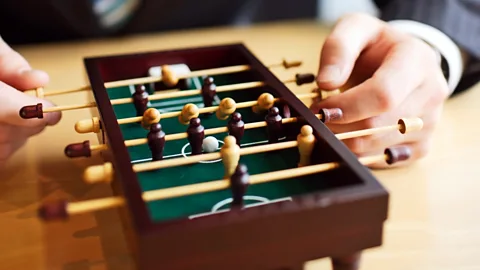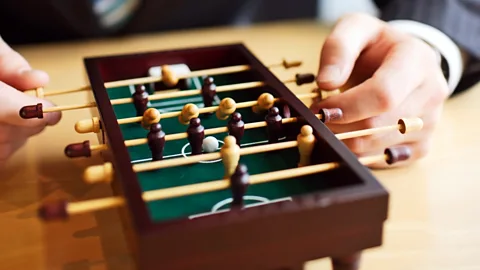The one hack you need to truly stop procrastinating
 Alamy
AlamyRight now. No, really, don’t wait until tomorrow. This simple formula could bring you a lot more success.
Does this sound familiar: You start the day with a long to-do list and several deadlines to meet. At the end of the day, you’re not sure where the time went, but you definitely didn’t cross a whole lot off the list.
Me too. That’s why a few months ago, I decided to create a daily calendar to plan out each hour of my typically unstructured workday.
Rather than staring at a bulging to-do list and never completing the most boring tasks, I wanted to work from a list that neatly designated a specific time for everything. An hour for pitching story ideas, 30 minutes to catch up on invoices and so forth. While an adjustment at first, creating a daily plan has become second nature. I get more accomplished without feeling overwhelmed.
 Alamy
AlamyIt could be a case study for the many psychologists who love talking about habits. Once something becomes a true habit, it requires very little willpower to keep it up.
As interest increases in self-improvement, habit formation is in the spotlight. Dozens of new book titles, including The Power of Habit by Charles Duhigg and Creating Habits for Lifelong Success by Robert Devito, only make the idea even more appealing.
“In a way, we are very much in charge of our habits because of what we repeat daily,” according to Dr Wendy Wood, a professor of psychology and business at the University of Southern California in the US. Still, habit formation “is not a magic bullet.”
Yes, I now create a detailed plan of my day in the early morning by typing out a calendar that’s easily visible on my laptop (I also colour-code deadlines in a Google calendar), but I still struggle with time management outside of work. And each afternoon, I struggle to stay focused, despite my calendar alerting me to do my next task.
The “goal” trap
The biggest mistake people make when they try to form a new habit: not making the distinction between habits and goals. Knowing the difference can help avoid anxiety.
“Goals can stress us out,” said Dr Lara Fielding, a supervisor psychologist at the University of California Los Angeles in the US,. “Focus on values rather than goals.”
 Alamy
AlamyFor example, stating you want to lose 20kg in two months can be more nerve-racking than simply deciding to make a habit of living a healthier lifestyle. Instead of a fixed goal, you’re changing what you value.
“Values are broader and inform moment to moment decisions” she added. Slightly tweaking your approach from one that sounds like a specific goal to one that conveys a deeper value can make it easier for a habit to stick.
And there’s more good news. Habits don’t follow a specific timeline, so don’t start counting down to how long a habit takes to build. If the idea is to do something continuously, then there’s no point to even ask the question of how long it takes, Rubin said. Some habits take years while others take days.
“It’s really up to the individual,” she said. “There’s no template…but the people who are truly successful are the ones who formed good habits”
The habit roadmap
That’s one reason why Fielding spends a lot of time figuring out what habits a person actually wants to implement. Otherwise, you might say you want to do something, but if it’s not what you really want to do, you’re unlikely to succeed.
People naturally “do more of what feels good and less of what feels bad”, Fielding explained. “If you can’t find a behaviour that you enjoy find a way of doing it that’s fun.” Most people don’t spend enough time choosing habits that can be enjoyable and easy to replicate in the long run, she said, and instead focus on the things they like least and have trouble getting motivated to even get started.
The idea is to find something about your future habit that’s actually fun for you.
For instance, if you want to make a habit of reading more this year, but your eyes hurt after a long day at the office, making a habit of straight reading might be difficult to pull off. But, you might find listening to books on tape more enjoyable, she said. If you really want to run regularly because you feel better when you’ve done so, but you find that venturing out on your own is boring or too quiet — to the point that you make excuses not to run — bring a friend or a dog to make it easier to stick to the habit.
 Alamy
AlamyWhen forming my calendar habit, I decided to email my daily calendar to a friend, which made it more enjoyable because I looked forward to her encouragement and replies. (Just beware the temptation to get off topic and waste too much time!)
When starting out, don’t take on too much too quickly. Focus on doing “small bite-size chunks” to form the habit, said Fielding. For instance, I sometimes skip a day of calendar making during hectic periods. But it’s useful to know that I haven’t failed when I don’t hit the mark every day.
To reward or not?
Once you’ve nailed an approach, some experts suggest you choose a meaningful reward. Rewards can help you form a habit faster because you create “shorthand associations for what behaviour to perform in a given context,” Wood said.
The reward can simply be a natural occurrence after continuing the habit (as in feeling better after exercise) or rewarding yourself with a 15-minute break if you’ve spent the entire morning without being distracted by Facebook.
Some rewards, however, could backfire. For example, rewarding yourself with a nice meal after losing weight may help motivate you to hit a goal but it might not make a habit explained Gretchen Rubin, New York-based author of Better Than Before: What I Learned About Making and Breaking Habits — to Sleep More, Quit Sugar, Procrastinate Less, and Generally Build a Happier Life. Rewarding a habit makes it less likely that you’ll keep it up, according to her research.
“The reward of healthy eating is healthy eating,” she said. “Whenever you reward yourself it undermines habit formation.”
In my case, my daily calendar has resulted in added productivity and that’s reward enough. I feel less frazzled and more accomplished.
Wise Up is a thinking person’s life hacking column in which we examine behaviour modification, self-help, found wisdom and applied philosophy.
